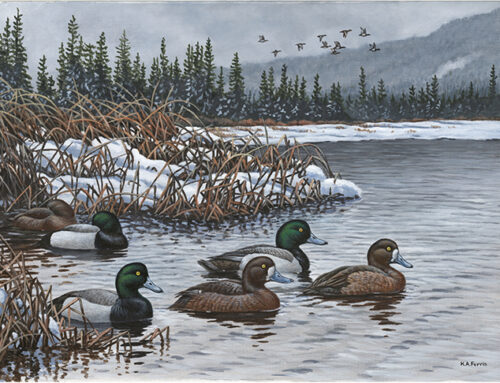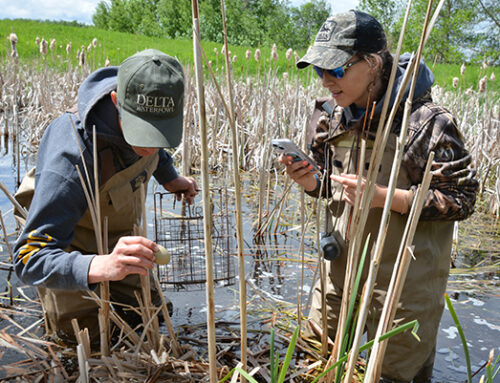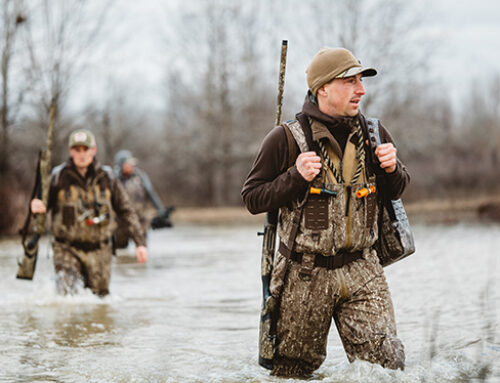Delta Waterfowl 2023 Conservation Leader Award Recognizes Advocates for the Future of Waterfowling
Award recipients advanced a once-in-a-generation piece of legislation for waterfowl management
During the second annual Duck Hunter’s Expo in Little Rock, Arkansas, Delta Waterfowl presented the 2023 Conservation Leader Award to Senator Sarah Elfreth of Maryland, Senator Jack Bailey of Maryland, Delegate Nick Allen of Maryland, and Stephen Carlyle of Manitoba, Canada.
This award recognizes an individual or individuals whose work has shown a clear commitment to advocating for endless opportunities for waterfowl hunters and ensuring the future of waterfowl hunting remains strong.

“This year, the Maryland General Assembly passed Senate Bill 327 and House Bill 983, a once-in-a-generation piece of legislation,” said Cyrus Baird, Delta’s senior director of government affairs. “It will transform the state’s ability to better manage for migrating waterfowl and expand access and opportunity to waterfowl hunters in the state.”
Introduced by Senator Elfreth and Delegate Nick Allen, and championed by Senator Jack Bailey, this legislation authorizes the Maryland DNR to increase license fees for resident hunters by $9.50 and for nonresidents by $20 to $30—the first such increases since 1989—while also raising the price of state migratory game bird stamps (a.k.a. state duck stamps) by $6. The added revenue will provide historic funding levels for vast conservation enhancements—including to habitats that attract and support migrating waterfowl—and improvements to infrastructures that provide access to quality waterfowl hunting.
Further, the law includes a robust R3 mechanism to enhance the state’s ability to recruit, retain, and reactivate hunters. Most notably, the legislation establishes the Wildlife Conservation, Education, and Outreach Program, which will provide hunting and conservation education at the elementary and middle school levels in underserved and underrepresented communities. The law also allows non-resident hunters attending a college or university within Maryland to pay the resident rate.
* * *
Delta Waterfowl and the Manitoba Habitat Heritage Corporation have been working together since MHHC’s inception in the 1980s. The main intersects between Delta and MHHC are the adoption of Hen Houses beginning in 1991, and the transition of Delta’s Adopt A Pothole program into a wetland easement program called ‘Potholes Plus’ in 1999. This one-of-a-kind program acts as a vehicle under the North American Waterfowl Management

Plan, allowing funds to be directed towards duck breeding grounds in Canada, specifically in Manitoba. State duck stamp funds are used as match to leverage U.S. federal money to provide millions for wetland easements in Manitoba. We’ve worked collaboratively to conserve Manitoba wetlands and produce incremental mallards.
MHHC also administers grant funding from the Conservation and GROW Trusts and the Fish and Wildlife Enhancement Fund that provide support for Delta’s Hen House program and student research program. The most notable program coming from these
Trust Funds is GROW, which includes durable and annual funding for a robust shallow wetland’s incentive program. MHHC recently transitioned into a non-profit, charitable organization.
Stephen Carlyle has worked with MHHC in various roles over the past two decades and was recently promoted to CEO. He leads a MHHC team of 35 employees and is a part of provincial, regional, national, and international efforts to conserve wetland and grassland habitat, while continuing to work with many partners—including Delta.
“Stephen has made distinctive alterations to MHHC’s wetland easement programming by prioritizing inclusion of shallow wetlands,” said Jim Fisher, vice president of Canadian policy for Delta Waterfowl. “These wetlands had
been under-represented in past easement programming and we appreciate and applaud these improvements going forward.”






Leave A Comment